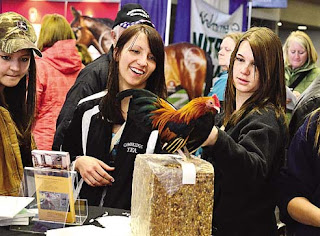There are few happy endings when it comes to the loss of a horse. You're left with an empty space and little to fill it. Understanding that your feelings are normal and finding ways to cope are important to the grieving process.
Mary Ellen Miller, LPC, Madison Psychotherapy Center, pointed out that an issue with losing a horse is with the people around you.
"There are not a lot of people you can talk to about losing a horse," Miller said.
Finding such connections is important for you to manage your grief. Turn to the Internet for blogs and social grouping of people in a similar situation. Seek out people you may know in the horse community who can understand what you are going through.
"To have your grief recognized by others as a legitimate concern and feeling is important to the healing process," she said. "You need to feel supported by other people in your grief."
Honor the memory of your horse any way you feel is appropriate, she said. Such things as collections of mementos, photo albums, scrapbooks and so forth can go a long way toward making you feel better. People will keep the ashes from cremated pets for years among other things.
There is a list of symptoms you need to be aware of that may signal deeper shock such as continuous uncontrolled crying, excessive disorganization, lack of sleep, disinterest in daily activities and in yourself, and guilt, Miller said, speaking at the 2013 Midwest Horse Fair.
"So you do need to know you are not alone," Miller said. "There are people who will have knowledge about your horse and be able to share experiences and memories with you."
Understand that your pain is normal. You shared a bond with your horse and when the animal dies that special bond is broken. The loss of such a strong bond is shocking and perhaps overwhelming in its early phase.
"Find positive people," Miller urged. "And you may find ways to express your grief in ways that are unique to you."
Grief has a framework of stages that include denial, anger, bargaining, depression and acceptance. Not everyone has each stage nor is the order of the stages the same for every individual, she said.
"There are people who get mad first," Miller said. "And, likewise, there are people who have perhaps had time to prepare and accept what has happened very quickly. But don't deny your feelings, and avoid judgmental people."
Anger is very common and one of the most visible phases of the grieving process. You'll get mad at everyone and everything and that can include the stable, the veterinarian, or anyone who gets within ear shot of your feelings.
Grief and loss are not limited to death of the horse. People die, too, leaving the horses to not know what is going on. Situations change for people. The loss of a job, for example, can force a horse owner to give up a much-loved animal.
"Horses really are members of the family," she said. "You come to depend on them for companionship, acceptance, emotional support and bonding. The bond is about our inner selves."
That type of relationship isn't easy for your non-horse-owning friends to grasp. Co-workers and other acquaintances are not likely to be very sympathetic unless they know you well or have had similar experiences.
"But you, on the other hand, are probably always wanting to talk about your horse and all the things you do with your horse," Miller said.
The acceptance phase, while merciful to achieve, still has some risks to manage. Miller suggests not immediately trying to find a "replacement" for your horse because it's unrealistic to think another horse will completely match the one you lost.
"Let yourself have some time to understand what a wonderful relationship you had," Miller said.
